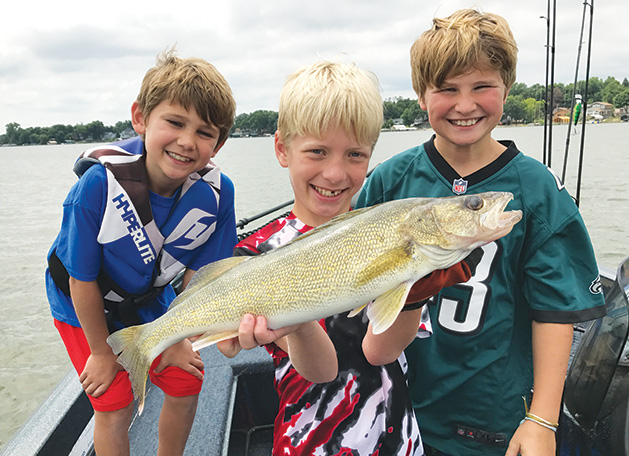
As far back as high school, Johnny Range dreamed of hooking a walleye from his own dock.
Walleye is a coveted and tasty catch among anglers like Range, but especially in Minnesota, where it is the state’s official fish.
“I would always say, ‘I’ll know I’m successful when I can do that,’” remembers Range.
When Range moved into his house on Lake Minnetonka in 2009, he now had the dock—but not the walleye biting on his fishing line. “I would see carp after carp swim by, and I would catch some panfish and bass, but no walleye,” says Range, who lives on Harrison Bay in Mound.
The walleye weren’t just being elusive from Range’s dock. It was that way elsewhere on Lake Minnetonka, too. He tells of participating in walleye tournaments on the lake, where only three or four of the 30 fishermen would catch one.
He learned from the Minnesota Department of Natural Resources (DNR) that walleye were having a difficult time reproducing in Lake Minnetonka. Growing tired of his fellow anglers’ complaints about the lack of good fishing there, Range decided to do something about it.
In 2012, he founded the Westonka Walleye Program (WWP), with the blessing of the DNR. Its mission is to sustain and improve the harvestable walleye in the lake. So far, the non-profit organization has raised about $200,000 to stock about 100,000 walleye in the lake.
“Everybody was pointing fingers, but nobody was doing anything,” Range says. “I found myself in a position where I was able to start this organization. It’s my chance to give back to the community.”
Stocking Up
Since the walleye population in the lake is made up almost entirely of stocked fish, Range says it’s important to keep adding to that.
The DNR stocks walleye in the lake in even-numbered years. In addition to those efforts, WWP stocks walleye each spring and fall. Range says the walleye purchased with private donations by WWP are brought by truck from a fish farm to the lake. Volunteers then wade out and release the fish directly from nets, spreading out the fish in the greener, more fertile water on the lake’s west side.
“If fishermen want to see more fish in the lake, we’ve got to stock them,” he says. “The DNR stocks about 6,000 pounds of fish every other year, and we’re on track to stock twice as many pounds as the DNR does.”
The program stocks walleye between 8 and 13 inches, while the DNR stocks 2- to 4-inch fish called fingerlings.
Range says, “Stocking a larger-sized fish gives the fish a much better chance of growing to a harvestable size and a better chance a fisherman can catch it.”
Range says the WWP’s efforts have paid off for him and other anglers enamored with hooking a walleye a little closer than some of the more prolific lakes for the fish in northern Minnesota. Range, a manufacturer’s sales representative, has caught walleye off his dock and then some.
“I’ve had some of the most incredible fishing of my life here,” he says. “I caught 53 walleye in three hours between me and a friend, which is unheard of for metro lakes. It’s like going to Canada, but you’re 10 minutes from home.”
How to Help
Range is always looking for help, whether it’s monetary donations, time, or prizes to give away at the annual fundraiser, which happens each April. The WWP is run entirely by volunteers. He also asks anglers to support the group’s voluntary sportsman slot by releasing walleye smaller than 16 inches in length. “If we release a 13-inch fish, it will be a 16-inch fish next year, and a 16-inch fish is a much better-sized fish to harvest,” he explains. For more information, you can email Range at johnny@472fish.org.
Westonka Walleye Program
612.803.0010
Facebook: Westonka Walleye Program









